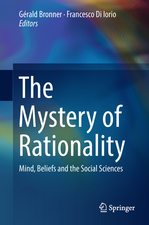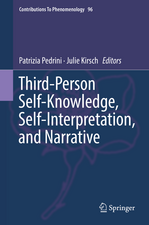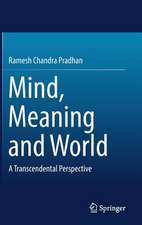Psychosyntax: The Nature of Grammar and its Place in the Mind: Philosophical Studies Series, cartea 129
Autor David Pereplyotchiken Limba Engleză Hardback – 17 oct 2017
| Toate formatele și edițiile | Preț | Express |
|---|---|---|
| Paperback (1) | 561.44 lei 38-44 zile | |
| Springer International Publishing – 22 aug 2018 | 561.44 lei 38-44 zile | |
| Hardback (1) | 648.42 lei 6-8 săpt. | |
| Springer International Publishing – 17 oct 2017 | 648.42 lei 6-8 săpt. |
Din seria Philosophical Studies Series
-
 Preț: 407.78 lei
Preț: 407.78 lei - 15%
 Preț: 644.95 lei
Preț: 644.95 lei - 18%
 Preț: 1120.18 lei
Preț: 1120.18 lei - 18%
 Preț: 1005.43 lei
Preț: 1005.43 lei - 15%
 Preț: 640.06 lei
Preț: 640.06 lei -
 Preț: 381.21 lei
Preț: 381.21 lei -
 Preț: 391.61 lei
Preț: 391.61 lei - 15%
 Preț: 640.88 lei
Preț: 640.88 lei - 15%
 Preț: 639.25 lei
Preț: 639.25 lei - 18%
 Preț: 1221.51 lei
Preț: 1221.51 lei - 18%
 Preț: 947.18 lei
Preț: 947.18 lei - 18%
 Preț: 955.56 lei
Preț: 955.56 lei - 18%
 Preț: 950.96 lei
Preț: 950.96 lei - 15%
 Preț: 645.47 lei
Preț: 645.47 lei - 15%
 Preț: 635.79 lei
Preț: 635.79 lei - 15%
 Preț: 644.82 lei
Preț: 644.82 lei - 18%
 Preț: 950.66 lei
Preț: 950.66 lei -
 Preț: 386.00 lei
Preț: 386.00 lei - 15%
 Preț: 644.82 lei
Preț: 644.82 lei - 15%
 Preț: 642.18 lei
Preț: 642.18 lei - 15%
 Preț: 643.48 lei
Preț: 643.48 lei - 18%
 Preț: 944.99 lei
Preț: 944.99 lei - 15%
 Preț: 638.76 lei
Preț: 638.76 lei - 20%
 Preț: 553.25 lei
Preț: 553.25 lei - 20%
 Preț: 560.31 lei
Preț: 560.31 lei - 18%
 Preț: 951.29 lei
Preț: 951.29 lei - 18%
 Preț: 893.40 lei
Preț: 893.40 lei - 20%
 Preț: 566.76 lei
Preț: 566.76 lei - 18%
 Preț: 951.77 lei
Preț: 951.77 lei
Preț: 648.42 lei
Preț vechi: 762.85 lei
-15% Nou
Puncte Express: 973
Preț estimativ în valută:
124.07€ • 135.20$ • 104.55£
124.07€ • 135.20$ • 104.55£
Carte tipărită la comandă
Livrare economică 23 aprilie-07 mai
Preluare comenzi: 021 569.72.76
Specificații
ISBN-13: 9783319600642
ISBN-10: 3319600648
Pagini: 330
Ilustrații: XXV, 302 p. 40 illus.
Dimensiuni: 155 x 235 mm
Greutate: 0.64 kg
Ediția:1st ed. 2017
Editura: Springer International Publishing
Colecția Springer
Seria Philosophical Studies Series
Locul publicării:Cham, Switzerland
ISBN-10: 3319600648
Pagini: 330
Ilustrații: XXV, 302 p. 40 illus.
Dimensiuni: 155 x 235 mm
Greutate: 0.64 kg
Ediția:1st ed. 2017
Editura: Springer International Publishing
Colecția Springer
Seria Philosophical Studies Series
Locul publicării:Cham, Switzerland
Cuprins
Chapter 1. The Ontology of Language and the Methodology of Linguistics.- Chapter 2. Cognitivism and Nominalism in the Philosophy of Linguistics.- Chapter 3. E-Language and I-Language.- Chapter 4. Language Acquisition and the Explanatory Adequacy Condition.- Chapter 5. Mental Phrase Markers in Sentence Processing.- Chapter 6. Two Attempts to do without Mental Phrase Markers.- Chapter 7. Representation, Embodiment, and Subpersonal States.- Chapter 8. Computational Models and Psychological Reality.- Chapter 9. The Psychological Reality of Syntactic Principles.- References.
Textul de pe ultima copertă
This volume examines two main questions: What is linguistics about? And how do the results of linguistic theorizing bear on inquiry in related fields, particularly in psychology? The book develops views that depart from received wisdom in both philosophy and linguistics. With regard to questions concerning the subject matter, methodological goals, and ontological commitments of formal syntactic theorizing, it argues that the cognitive conception adopted by most linguists and philosophers is not the only acceptable view, and that the arguments in its favor collapse under scrutiny. Nevertheless, as the book shows, a detailed examination of the relevant psycholinguistic results and computational models does support the claim that the theoretical constructs of formal linguistics are operative in real-time language comprehension. These constructs fall into two categories: mental phrase markers and mental syntactic principles. Both are indeed psychologically real, but in importantly different ways. The book concludes by drawing attention to the importance of the often-elided distinction between personal and subpersonal psychological states and processes, as well as the logical character of dispositional and occurrent states. By clarifying these concepts, particularly by reference to up-and-running psychological and computational models, the book yields a richer and more satisfying perspective on the psychological reality of language.
Caracteristici
Provides a detailed study of the co-evolution of syntactic theory and computational parsing models Is an empirically informed philosophical account of the psychological reality of syntactic constructs Presents an up-to-date discussion and philosophical critique of the subject
























